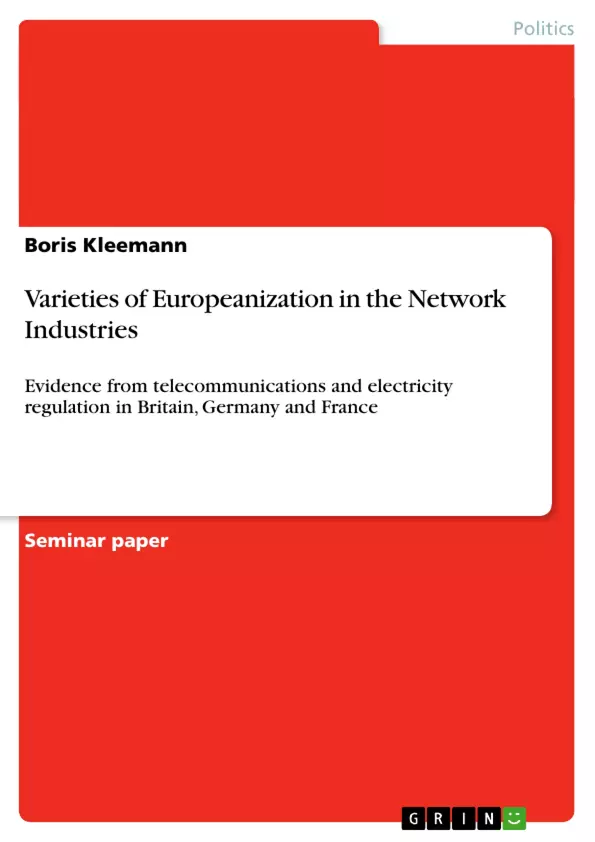Questions of de- and re-regulation of network-based utilities are crucial for the creation of the European single market. Whereas a broad discourse concerning better regulation has been launched and developed over years in the European Union (EU), advanced by the gradually re-formulated Lisbon Strategy, different explanatory concepts of European integration and its effects on national economic regimes persist without cross-fertilizing one another. These thoughts are inspired by the apprehension that we will have to present an encompassing evaluation of the outcomes of the Lisbon Agenda as soon as 2010, while still lacking a differentiated scientific understanding of the foundations of this common economic and regulatory space which is now about to become the most dynamic, competitive and sustainable in the world.
Inhaltsverzeichnis (Table of Contents)
- Introduction
- Theoretical Debate
- Europeanization: Impact dimensions and the question of goodness of fit
- Varieties of Capitalism: Production regimes and their path-dependencies
- Non-EU explanations for inertia and change in the utilities sectors
- Sector characteristics and incremental reforms prior to Europeanization
- Operationalizing internationalization for the explanation of regulatory change
- Varieties of Europeanization in the utilities sectors
- Economic and legal ambivalences: integration of European telecommunications
- Two-level games: political negotiations for the integration of European electricity
- Conclusion
- References
Zielsetzung und Themenschwerpunkte (Objectives and Key Themes)
This work aims to provide a comprehensive analysis of the impact of Europeanization on the telecommunications and electricity sectors in Britain, Germany, and France. The study examines how national regulatory regimes have been influenced by EU policies and explores the extent to which these sectors have converged or diverged across these countries. The key themes of the study include:- The role of Europeanization in driving regulatory change in network industries
- The interplay between European and national interests in shaping regulatory frameworks
- The influence of national institutional contexts on the implementation of EU policies
- The impact of Europeanization on the convergence or divergence of regulatory regimes
- The challenges and opportunities associated with integrating national utilities sectors into a single European market
Zusammenfassung der Kapitel (Chapter Summaries)
The introduction lays out the research problem, arguing that while the Lisbon Strategy aims for a more dynamic and competitive European market, there remains a lack of understanding regarding the foundations of this common economic space. The author emphasizes the importance of studying the effects of Europeanization on national economic regimes and highlights the limitations of existing theories like Europeanization and Varieties of Capitalism.
Chapter 2 introduces the two main theoretical frameworks: Europeanization and Varieties of Capitalism. Europeanization theory examines the influence of EU policies on national public policies and focuses on the isomorphic effects of EU legislation. The chapter then delves into the impact dimensions of Europeanization, exploring four sources: coercion, mimetic pressure, professionalization, and domestic politics. It also examines how the concept of "goodness of fit" determines the likelihood of domestic change in response to EU policies.
Chapter 3 shifts the focus to non-EU explanations for inertia and change in the utilities sectors. The author discusses how sector characteristics and incremental reforms prior to Europeanization have shaped the current regulatory landscape. The chapter then examines the operationalization of internationalization for explaining regulatory change, exploring the role of different actors and forces in influencing regulatory policy.
Chapter 4 delves into the varieties of Europeanization within the utilities sectors. It examines the integration of European telecommunications and electricity markets, highlighting the economic and legal ambivalences of the integration process. The chapter also analyzes the role of "two-level games" in the political negotiations for the integration of European electricity.
Schlüsselwörter (Keywords)
The keywords and focus topics of this work include Europeanization, Varieties of Capitalism, network industries, telecommunications, electricity regulation, regulatory convergence, regulatory divergence, goodness of fit, institutional change, and cross-national comparison. The study examines the impact of EU policies on national regulatory regimes in the context of a single market for utilities, focusing on the interplay between national and European interests, and the influence of national institutional contexts.Frequently Asked Questions
What is the focus of "Varieties of Europeanization in the Network Industries"?
The study analyzes how EU policies (Europeanization) impact national regulatory regimes in the telecommunications and electricity sectors, specifically in Britain, Germany, and France.
What theoretical frameworks are used in this work?
The author combines "Europeanization" theory (focusing on EU policy influence) and "Varieties of Capitalism" (focusing on national production regimes and path dependencies).
What does the concept "goodness of fit" mean?
"Goodness of fit" refers to the degree of compatibility between EU requirements and existing national institutional structures. It determines how likely a country is to change its domestic policies in response to EU mandates.
How do telecommunications and electricity markets differ in their integration?
Telecommunications integration often involves economic and legal ambivalences, while electricity market integration is heavily shaped by "two-level games" involving political negotiations between national and European actors.
What is the role of the Lisbon Strategy in this context?
The Lisbon Strategy aimed to make the EU the most competitive and dynamic economic space. This work evaluates how the regulatory foundations of network industries support or hinder this goal.
- Quote paper
- Boris Kleemann (Author), 2009, Varieties of Europeanization in the Network Industries, Munich, GRIN Verlag, https://www.grin.com/document/135710



